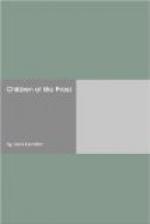He placed a stick carefully upon the fire and resumed his meditations. It was the same everywhere, with all things. The mosquitoes vanished with the first frost. The little tree-squirrel crawled away to die. When age settled upon the rabbit it became slow and heavy, and could no longer outfoot its enemies. Even the big bald-face grew clumsy and blind and quarrelsome, in the end to be dragged down by a handful of yelping huskies. He remembered how he had abandoned his own father on an upper reach of the Klondike one winter, the winter before the missionary came with his talk-books and his box of medicines. Many a time had Koskoosh smacked his lips over the recollection of that box, though now his mouth refused to moisten. The “painkiller” had been especially good. But the missionary was a bother after all, for he brought no meat into the camp, and he ate heartily, and the hunters grumbled. But he chilled his lungs on the divide by the Mayo, and the dogs afterwards nosed the stones away and fought over his bones.
Koskoosh placed another stick on the fire and harked back deeper into the past. There was the time of the Great Famine, when the old men crouched empty-bellied to the fire, and let fall from their lips dim traditions of the ancient day when the Yukon ran wide open for three winters, and then lay frozen for three summers. He had lost his mother in that famine. In the summer the salmon run had failed, and the tribe looked forward to the winter and the coming of the caribou. Then the winter came, but with it there were no caribou. Never had the like been known, not even in the lives of the old men. But the caribou did not come, and it was the seventh year, and the rabbits had not replenished, and the dogs were naught but bundles of bones. And through the long darkness the children wailed and died, and the women, and the old men; and not one in ten of the tribe lived to meet the sun when it came back in the spring. That was a famine!
But he had seen times of plenty, too, when the meat spoiled on their hands, and the dogs were fat and worthless with overeating—times when they let the game go unkilled, and the women were fertile, and the lodges were cluttered with sprawling men-children and women-children. Then it was the men became high-stomached, and revived ancient quarrels, and crossed the divides to the south to kill the Pellys, and to the west that they might sit by the dead fires of the Tananas. He remembered, when a boy, during a time of plenty, when he saw a moose pulled down by the wolves. Zing-ha lay with him in the snow and watched—Zing-ha, who later became the craftiest of hunters, and who, in the end, fell through an air-hole on the Yukon. They found him, a month afterward, just as he had crawled halfway out and frozen stiff to the ice.




